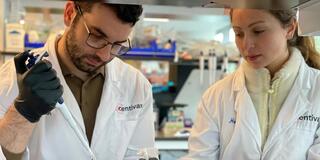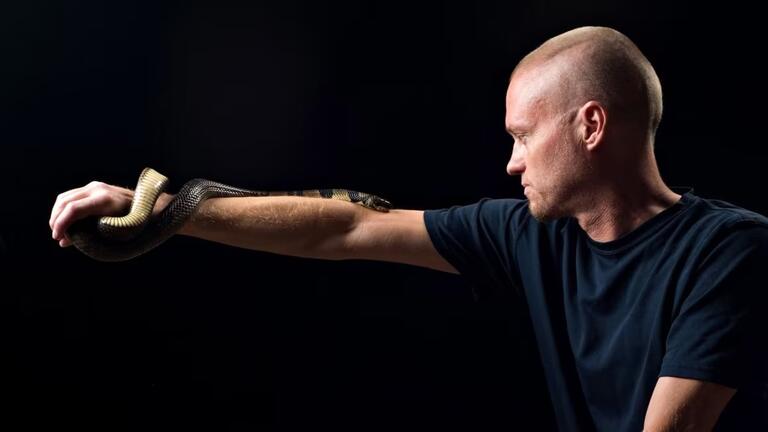USF Alumni Developing a Universal Cure for Snakebites

Each day, 12,000 people are bitten by venomous snakes worldwide. Three USF graduates are working towards the antidote.
They work on a team developing the first universal antidote to snake venom. In June, the team published details of its research in Cell, a peer-reviewed scientific journal.
“This research is a big deal,” said co-author Mark Bellin MS ’22, a senior scientist at Centivax in South San Francisco. “According to the World Health Organization, snakes kill more than 100,000 people each year, so a universal antivenom could save millions of lives.”
The research paper in Cell is essentially a recipe, Bellin said. Instead of keeping the antivenom recipe a secret as is common practice in the biotech industry, the team published it.
“We want to share it so that other scientists can join us in working on it,” he said.
Bellin and two other graduates of the biotechnology master’s program, Joel Andrade MS ’21 and Hannah Hirou MS ’23, are working to develop the universal antivenom at Centivax, a biotechnology company founded by Jacob Glanville, an immunologist who serves on USF’s biotechnology scientific advisory board.
Glanville started this antivenom research eight years ago when he met Tim Friede, a man who allowed himself to be bitten by snakes more than 200 times over 18 years. Friede developed antibodies in his blood that neutralize the venom of not just one species of snake but a range of snakes, including cobras, mambas, kraits, and taipans.
Friede offered Glanville 40 milliliters of his blood for research. Glanville offered Friede a job at Centivax.
While the antivenom research shows promise, a universal antivenom drug is years from adoption, Bellin said. The next step in development is veterinary trials in Australia.
“A lot of dogs in Australia get bit by venomous snakes, so we’ll use our antivenom on dogs to help the dogs, and also to make sure our antivenom works,” he said.
After the trials on dogs in Australia, the team plans to move on to clinical trials on people in India, Bellin said. “We’d love to see this drug distributed all over India — and Africa, too.”
Millions of people in India and Africa work in fields, herd cattle, and live far from hospitals, he said. “They’re the people most likely to be bitten by snakes — and the least likely to find or afford today’s medical treatment for snakebites.”
Listen to Jacob Glanville talk about universal antivenom with Moira Gunn, USF professor, journalist, and host of the Tech Nation radio program.



